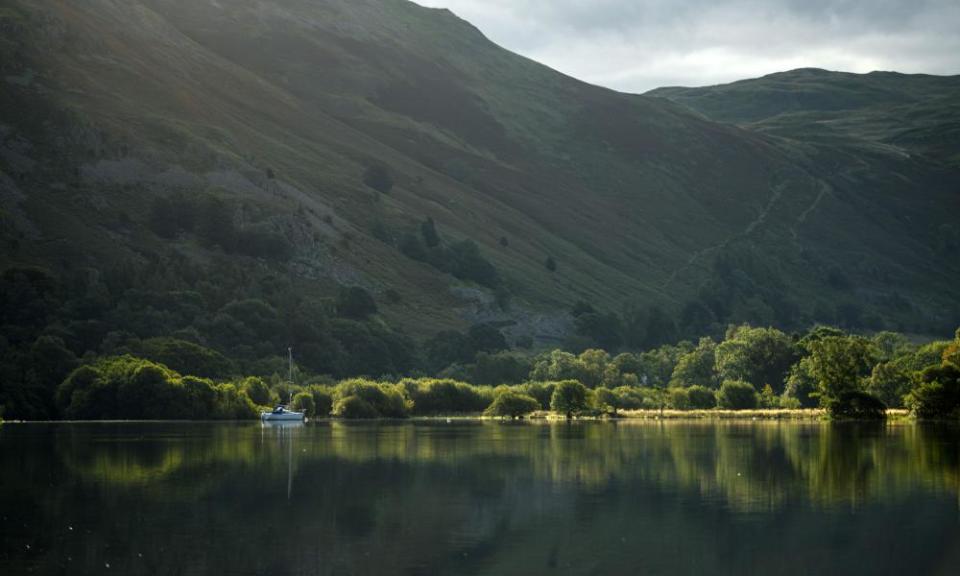Drunk swimming a growing danger in the Lake District

Drunk swimming is becoming an “increasing challenge” in the Lake District this summer, a national park spokesman has said, as visitors try to replicate boozy foreign holidays at home.
An estimated 40 people have drowned in the UK since the heatwave began on 14 July, triple the normal rate of water deaths, according to the National Water Safety Forum.
Tony Watson, head of visitor services and communications at the Lake District national park, said TikTok and Instagram were leading visitors to party in isolated locations where there have never previously been issues.
On Friday three Cumbrian fire and rescue teams were dispatched to Ullswater to reports of a male in distress.
Owen McCarney, station manager for Keswick, Frizington, Cockermouth and Whitehaven, tweeted his frustration at the incident. “The intoxicated male managed to get out as teams arrived. Resources were unnecessarily tied up when they may be needed elsewhere. ALCOHOL AND SWIMMING DO NOT MIX,” he said.
Watson said people swimming while drunk was “an increasing challenge this summer”.
Related: Staff in UK riverside venues to be trained to help stop people drowning
He explained: “What we are seeing is a massive desire to be near the water, and what used to be lake shores are now beaches, and there’s a lot of booze consumed. That booze really reduces people’s common sense and fear factor. We might be having Mediterranean air temperatures but we’ve still got traditionally cold northern English waters.”
The Lake District has been very busy with holidaymakers who would usually go abroad, said Watson: “Obviously, international travel is very complex so we’re seeing a lot of people trying to replicate foreign holiday holidays in domestic locations.”
As well as an increasing appetite for wild swimming, there has also been a rise in popularity in other water activities, with visitors turning up with cheap paddleboards without the right safety equipment, said Watson. “The middle aisle of Lidl is often on our lakes. We see Lidl selling paddleboards but we don’t see them selling buoyancy aids.”
There are regular parties on lake shores, said Watson: “A lot of people are behaving really well until the booze makes them slightly braver and they go swimming.”
Watson said social media was encouraging visitors to crowd into previously obscure swimming spots, rather than the main lakes. “There’s the amplification on social media, where a waterfall or a little water pool will appear on Instagram or Tik Tok and it will become an attraction that we’ve never had a problem with before,” he said.
Dawn Whittaker, chair of the National Water Safety Forum and the National Fire Chiefs Council lead for water safety and drowning prevention, said: “[Drunk swimming] is a problem every year … Last year we had 242 accidental drownings, and out of that 69 people [29%] were recorded as as having alcohol or drugs in their blood.”
Water deaths predominantly involve young men, with most fatalities in the 20-24 age group, she said.
Related: King’s College in Cambridge reviews its ban on wild swimming
The last 10 days have been “really awful” for drownings, said Whittaker – the hot weather coinciding with the school and university summer holidays, plus the number of people holidaying in the UK. “They’re not going abroad and going to their nice swimming pools … and so the reality is that the days since the heatwave began on 14 July have been awful, really awful. I have to admit to you, I stopped counting the deaths after 30 because it’s just too painful.”
In a normal year there is a water death every 20 hours in the UK. “We’ve seen that treble in the past 10 days,” said Whittaker. She said she didn’t have the latest statistics but she expected the death numbers since 14 July to be “nearing the doors of 40 as of the end of this weekend”.
Kevin Rahill, a water safety expert from the Royal National Lifeboat Institution, said alcohol not only impairs judgment but makes swimmers more susceptible to hypothermia and cold water shock. “Alcohol will cause the blood vessels to dilate, so there’s a lot more heat lost more quickly, and it can really affect survival times in the water,” he said. “Our advice is: if you’re going to have alcohol, don’t go in the water.”

 Yahoo Finance
Yahoo Finance 